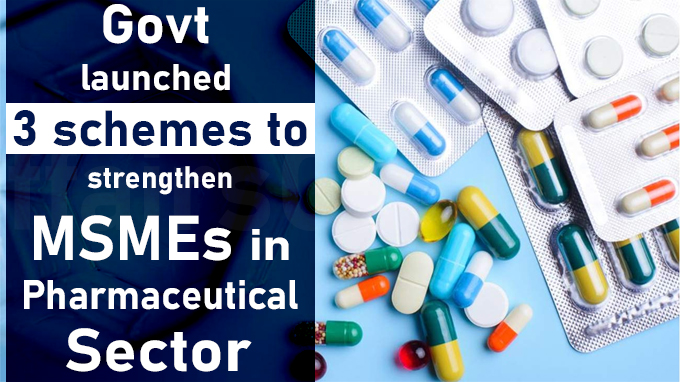
On July 21, 2022, Union Minister Dr. Mansukh Mandaviya, Ministry of Chemicals & Fertilizers formally introduced sub three schemes to strengthen Micro, Small and Medium Enterprises (MSMEs) in the pharmaceutical industry under the parent scheme “Strengthening Pharmaceuticals Industry” (SPI).
The schemes were launched at Dr. Ambedkhar International Convention Centre, Janpath, New Delhi, Delhi, in the presence of Minister of State (MoS) for Chemicals and Fertilizers Bhagwanth Khuba and a large number of pharmaceutical (pharma) MSME industry players and representatives of major pharma associations.
- The schemes call for the establishment of clusters of Effluent Treatment Plants (ETPs), Common Research Centres, and Technology Upgradation for pharma MSMEs.
- The Small Industries Development Bank of India (SIDBI) will serve as Project Management Consultant for implementing the scheme.
- Sub Schemes Under SPI:
1.Pharmaceutical Technology Upgradation Assistance Scheme (PTUAS)
2.Assistance to Pharma Industries for Common Facilities Scheme (API-CF)
3.Pharmaceutical and Medical Devices Promotion and Development Scheme (PMPDS)
“Strengthening Pharmaceuticals Industry” (SPI):-
- The SPI Scheme is allocated an amount of Rs. 500 crore for 5 years, i.e., from Financial Year (FY) 2022 to FY 2026 (FY22-FY26).
- The amount earmarked for three sub schemes of the Rs 500-crore five-year (FY22-FY26) SPI scheme is Rs.178 crore (APICF), Rs.300 crore (PTUAS), and Rs 21.5 crore (PMPDS). The guidelines for the scheme were launched in March 2022.
- Objective of SPI – To strengthen the existing infrastructure facilities in order to make India a global leader in the Pharma Sector.
- This scheme is enhancing India’s capabilities in the pharmaceuticals sector with an objective to make it much more competitive in terms of both quality and cost and also aimed at making Indian pharma MSMEs, a part of Global supply chain by incentivizing them to acquire World Health Organization , Good Manufacturing Practice (WHO GMP ) and Schedule M certifications.
Sub Schemes Under SPI:
i.Pharmaceutical Technology Upgradation Assistance Scheme (PTUAS)
Objective – To facilitate Micro, Small and Medium Pharma Enterprises (MSMEs) of proven track record to meet national and international regulatory standards .
- It includes provisions for a capital subsidy of 10% on loans with a maximum ceiling of Rs. 10 crore and a minimum repayment period of 3 years, as well as an interest subvention of up to 5% (6% in the case of units owned by Scheduled Castes (SC)/Scheduled Tribes (ST)) on a reducing balance basis.
Allocated Amount: Rs. 300 crore
ii.Assistance to Pharma Industries for Common Facilities Scheme (API-CF)
This scheme would enhance the capabilities of existing pharmaceutical clusters for sustained growth by creating common facilities.
- It provides for assistance up to Rs. 20 crore, or 70% of the approved project cost, whichever is less.
- For the Himalayan and North-East Regions (NER), the grant-in-aid will be equal to the lesser of Rs. 20 crore per cluster or 90% of the project cost, whichever is less.
Allocated Amount: Rs. 178 crore
iii.Pharmaceutical and Medical Devices Promotion and Development Scheme (PMPDS)
Objective – To facilitate growth and development of Pharmaceutical and Medical Devices Sectors through the preparation of study reports on topics essential to the Indian pharma and medical device industry.
- Its goal is to compile a database of the pharma and medical device industries.
Allocated Amount: Rs. 21.5 crore
The PTUAS scheme will support MSMEs in technical advancement and reaching global standards, while the API-CF scheme will help clusters become stronger and better comply with various regulatory requirements.
Significance
i. The initiatives under the scheme are designed to strengthen India’s pharma industry capabilities and increase its level of cost- and quality-competitiveness.
ii.It also aims to integrate Indian pharmaceutical MSMEs into the global supply chain, by encouraging them to obtain Schedule M certification or Good Manufacturing Practice (GMP) certification by the World Health Organization (WHO) through the sub-scheme PTUAS.
- GMP certification is a standard established by the WHO to guarantee that products are produced and controlled in accordance with the standards for quality.
- Schedule M is titled “Good Manufacturing Practices And Requirements Of Premises, Plant And Equipment For Pharmaceutical Products”.
- MSMEs would be able to choose between a capital subsidy and an interest subsidy to upgrade their production facilities to WHO-GMP or Schedule-M standards.
iii. The Scheme offers support of up to Rs 20 crore each for common facilities, such as Research Centres, Testing Labs, and ETPs in Pharma Clusters.
- It also offers credit-linked capital and interest subsidies for Technology Upgradation of MSME units in the pharmaceutical sector.
Scope of Indian Pharmaceutical Sector
i. According to the Indian Economic Survey 2021, the Indian pharmaceutical market is anticipated to grow three times in this decade, from USD 42 billion in 2021 to USD 65 billion by 2024, and then to USD 120–130 billion by 2030.
ii.India Brand Equity Foundation (IBEF) estimates that the Indian pharmaceutical industry supplies more than 50% of the world’s demand for various vaccines.
- IBEF is a Trust established by the Department of Commerce, Ministry of Commerce and Industry (MoCI), Government of India.
iii. India is home to a network of 3,000 drug companies and over 10,500 manufacturing facilities, positioning it 3rd in terms of pharmaceutical production by volume and 14 in terms of value.
iv.The MSME category makes up about 40% of the participants chosen for the Production Linked Incentive (PLI) Scheme for Pharmaceuticals.
About Small Industries Development Bank of India (SIDBI):
Chairman & Managing Director – Sivasubramanian Ramann
Establishment –2nd April 1990
Headquarters – Lucknow, Uttar Pradesh




